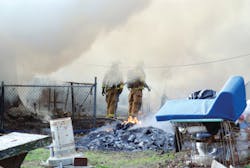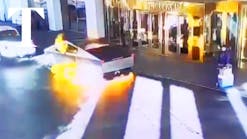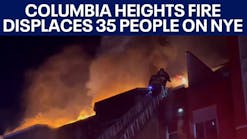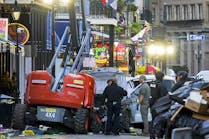We are a dynamic culture. We are men and woman who put the well-being of others above our own. For us, it’s not for money, medals or even prestige, but simply because it is the right thing to do. Daily, we represent the best of human nature and, in many cases, the last of the “knights in shining armor” for our communities.
Yes, we are a dynamic culture indeed, but ours is also a sick culture and that sickness, if left unacknowledged, may consume our profession.
There was a time when our culture was vibrant and fostered the type of family atmosphere, albeit occasionally and delightfully dysfunctional, that compelled brother to follow brother, and now sister, into unimaginable hells in the pursuit of saving others. Those firefighters of our past were warriors – but they died by the hundreds and left behind countless loved ones and unrealized lives. Those firefighters of our past developed a culture born out of necessity due to their limited knowledge of fire and the science behind it, such as flashpoint, fire point, flashover, BTUs and toxic gases. They were further handicapped by their limited technology and the resulting rudimentary tools. Because of these era-controlled limits, they were forced to expend great risk in the pursuit of saving others. Having to help one another survive under those circumstances gave birth to the term “brotherhood,” as they took risks and died for one another as well as for perfect strangers. That is the foundation our culture is based on – the concept of doing anything and everything, whether on or off duty, within our means to keep one another and those we have sworn to protect safe. The “brothers” of that earlier time did so because their options were limited, but today that is just not the case.
With the knowledge and technology we have today, other options are available that significantly reduce our risk. But we have warped the once-noble culture of “brotherhood” into something it was not intended to be by constantly exposing ourselves to unnecessary risks to fulfill it. I feel certain that if our fallen brethren of those earlier times who lost their lives due to the limits of that era saw how we still approach our profession today, they would be disappointed in what we are doing in their name. They would, without a doubt, give everything to have another chance at the life they lost by taking advantage of every opportunity we have today to keep one another safe.
At a fire service gathering, I asked an engine company officer from another state, whom I had met just minutes earlier, that if his company crossed the several states that separated us and responded to my community for mutual aid and on his arrival to the scene he witnessed a horrific explosion and collapse with rapidly deteriorating conditions, and he heard my Mayday, would he risk his life and the lives of his company members to rescue me? He stood taller and with tremendous pride stated he would do so without hesitation. When asked why, even though did not even know me, he would risk his life and the lives of his crew to come in after me, his face changed to an emotional, yet quizzical expression as he replied, “Because you’re my brother!”
Then I asked him whether he conducts fire prevention activities with his company or leads prevention programs for his department. A bit more hesitant, but nevertheless quizzical, he replied, “No.” So a company officer who so loves his “brothers” and “sisters” that he would risk, and possibly surrender, his life and the lives of his crew to rescue a firefighter in trouble makes no effort whatsoever to prevent that firefighter from being put in danger in the first place by preventing the fire or installing a simple $10 smoke detector.
Consider taking your engine company out into your first-due district on a hot afternoon and spending the entire day in the sun going door to door doing fire-safety checks and installing smoke detectors to decrease the chances of responding to a fire that night so your crew remains safe in their station and goes home to their families at the end of the shift. Wouldn’t that be a form of that same brotherhood we pride ourselves in – to do anything and everything within our power to keep each other safe?
Train to Prevent Tragedies
As I review the training programs of fire service conferences and training symposiums nationwide, even in states that are leaders in firefighter and civilian fire deaths, I see that classes centering on reactive firefighter survival predominate the schedules. It’s not that these classes in themselves are an issue, for they are very important and the information is much needed. Rather, it is the fact that those classes make up a significant portion of the programs, second only to strategy and tactics. If fire prevention classes are available at all, they are few and far between, just as it is in many recruit-training programs, where education in fire prevention for new firefighters is largely an afterthought – a nuisance block that must be checked off to merely say it was done. Yet this is the training that will most certainly save their lives and allow them to complete not only a fulfilling 20- to 30-year fire service career, but enjoy many more healthy years after their badges are turned in.
By focusing our training on reactive firefighter survival, are we not placing more emphasis on saving ourselves in a reactive nature to preventable risk taking rather than focusing our efforts and training on preventing the event from occurring and protecting the very people who depend on us? Isn’t this being selfish? Doesn’t this approach actually place less value on the lives and safety of our fellow firefighters by pursuing our own self-fulfillment through exciting and physically challenging training? Wouldn’t it be better to use our training, experience and time to identify the fire hazard before the chain of events can start? Yet we continue to respond into fire-prone neighborhoods without taking the time to educate residents on smoke detectors and basic fire hazards or develop the types of relationships with them that could allow us to effect change.
Now you see the sickness. Our once-strong culture, born out of tremendous sacrifice and out of the necessity derived from a lack of knowledge, technology and tools, has suddenly been warped into a culture that puts more value on reacting to preventable risk taking than on eliminating the risk from the start. We do this all in the name of a culture we call “brotherhood.” But that’s not what they intended when the term was coined. They took risks and lost their lives because they lacked options that are available today. We do it freely.
Make no mistake: firefighting is an inherently dangerous job, and firefighters must take calculated risks to save lives, including their own. No matter how much we train and try, things will still go wrong and firefighters will be injured or lose their lives. Those firefighters deserve our uniforms, parades and tears. Because of these undeniable facts, current training schedules and programs must continue. But to accept losing a firefighter to a predictable and thus preventable occurrence should be, in the name of the “brotherhood” we proclaim to live by, completely unacceptable by the standards of those who have gone before.
Identifying Hazards
The cure is not in placing less emphasis on strategy, tactics and firefighter-survival training, but in placing equal emphasis on using the knowledge, technology and tools that years of sacrifice have provided for prevention, and training and preparing firefighters to identify and eliminate the hazards that have been killing citizens and firefighters for centuries.
The heroes who went before us passed onto us a culture of honor called “brotherhood.” Out of necessity, they took great risks to protect one another and those they served, and in doing so many made the ultimate sacrifice. But how do you think those left behind by “brothers” who died in the line of duty would feel about failing to take the time to install smoke detectors or conduct inspections in the buildings in which their “brothers” were lost? Think about your next call and the “brother” or “sister” firefighter at your side – do you want that same regret? Do you love them enough to get off the recliner and get into your most hazardous neighborhoods and prevent just one fire, just one exposed risk, just reduce the chances of a potential line-of-duty death even if by 1%? Is this not “brotherhood?” It’s time to truly live the “brotherhood” and be safe and healthy.
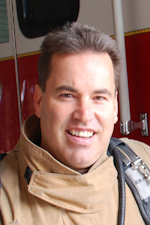
Daniel Byrne
DANIEL BYRNE is a community support officer for the Burton Fire District, Beaufort County, SC, and a retired assistant fire chief of training for the Georgia Air National Guard 165th Fire Department. A third-generation firefighter, he holds an associate degree and a bachelor’s degree in fire science as well as a master’s degree in public administration and disaster management. Byrne is an alumnus of the National Fire Academy. He received state and local awards for public relations and educational programs as well as community partnerships and served as a conference presenter and keynote speaker.
